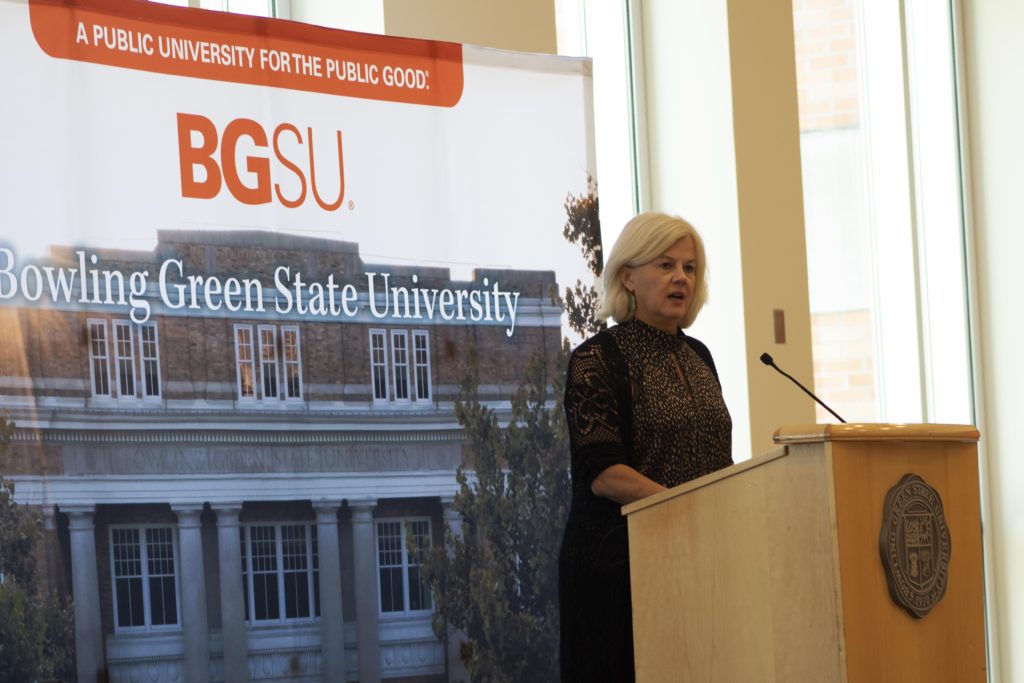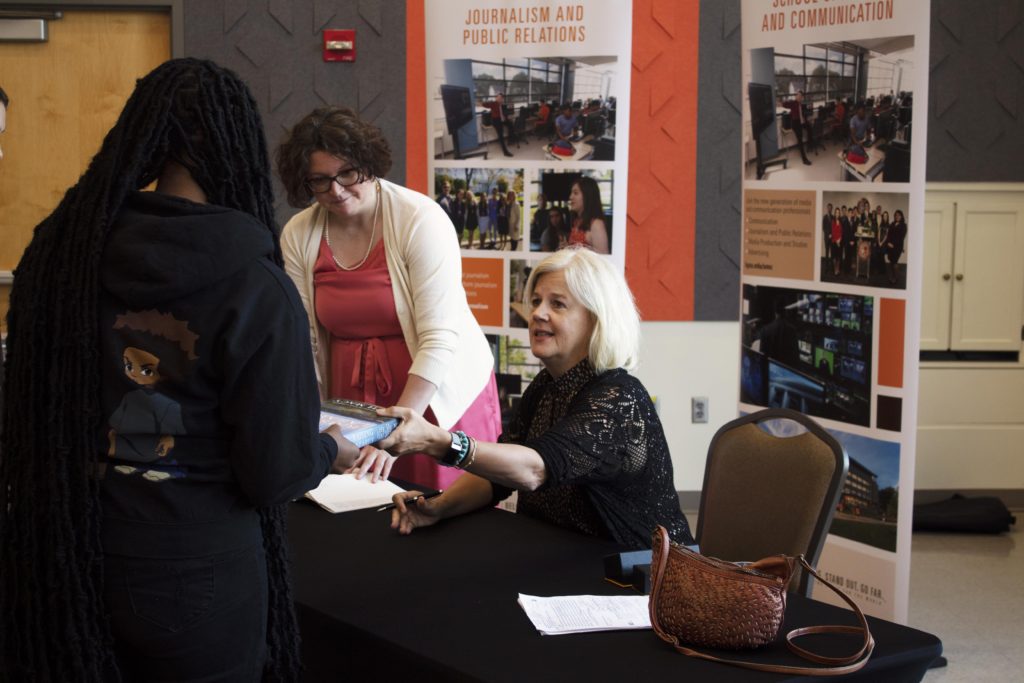By Faith Zochowski
Beth Macy, class of ‘86, returned to BGSU on Thursday, Sept. 15 to talk to students and faculty about her life as a journalist. Her discussion occurred hours before her induction into the 2022 Class of the Academy of Distinguished Alumni, which was held Thursday evening.

President Rodney Rodgers introduced Macy and welcomed her back to where her career started.
Macy began with describing her time on campus as a first-generation student. She came from a poor family and went to school fully on Pell grants. She felt like an outsider to her peers, but that gave her a lens to view her life through to this day. She starts with people like her who grew from nothing when first researching for stories.
“I start with the people who are taking out the trash, and I work my way up,” she said.
She credited her teachers at BGSU for giving her the knowledge she carried throughout her career. Vicki Hesterman, her feature writing teacher, was in attendance. Hesterman helped Macy to be published in Seventeen magazine as a sophomore. She helped her find her voice.
“When I write the things I really care about, I kick ass,” Macy said.
Macy spoke of the Nieman Fellowship she attended at Harvard University in 2010 where she was surrounded by the best journalists in the country. She came to the conclusion that they were not smarter than her but were better connected because they came from higher-class families or more populated cities than Urbana, Ohio. The Nieman Fellowship gave her the confidence to begin writing her own books.
After her fellowship, she stumbled upon a story idea that became her first novel, “Factory Man.” She met John Bassett III, who owned a furniture company in Galax, Virginia. He sued China in order to keep his company in business, and he won.
“When somebody does something different and wins, that’s a story,” Macy said. “We learn through story, not through data.”
Macy also spoke of her time as a feature writer at the Roanoke Times, where she wrote on and off for 25 years. She recalled a story she wrote about 14-year-old Celina who worked behind the desk of the local library. She grew up in the projects, but was first in her class and the first to go to college not only in her family, but in her entire neighborhood.
The town had a jar of coins on the library desk to send her to France for her French club. They rallied behind her.
Macy was with Celina when she got a full ride to Harvard. All of those around wept. Celina now runs her own library.
Macy said these are the stories that matter to be told.
“It still gets me choked up,” she said.
She spoke of struggling to write her first book proposal for “Factory Man” and the courage it took to quit her job to write books full time. She thanked her team for giving her that push.
“One of the most important decisions that you’ll ever make is who you choose to partner with. You should only want to be with people who love you and who are on your team. He’s been everything to me,” she said of her husband Tom, who was in attendance.
“Dopesick,” another novel written by Macy, follows the opioid crisis specifically in the neighboring areas of Appalachia, Virginia. The novel won a L.A Times Book Prize and was adapted into an 8-episode series on Hulu. The show was nominated for 14 Emmy’s and won two of those awards, which aired this past Monday, Sept. 12.
When Macy first gave “Dopesick” to her editor, she received a 6-page, single-spaced letter back stating everything that needed to change.
At the time, 187 people were dying daily from overdoses. Her friend said to write that number down and put up a picture of someone she lost from addiction above her computer as she worked. Her friend summarized her 6-page letter into 4 bullet points on how to improve the book. Macy never read the letter again.
Her friend gave her the advice, “You don’t have time for a panic attack.”
In “Dopesick,” Macy tells part of the story through Tess Henry, who is a young girl she met that battled addiction. She came from a wealthy family who had all the resources to help her get better.
Macy was in Dick’s Sporting Goods with her son the day after Christmas when Tess’s mother called to tell her she had passed. Macy and Tess’s grandad were the only ones to see her body. She even helped the family pick out the urn to hold her ashes.
“Sometimes, you just have to put your notebook aside and be a person,” she said.
After Tess’s passing, Macy began taking medication for anxiety and depression. She went to a psychiatrist to help her deal with the trauma. She spoke of friend and writer Roland Lazenby, who used to leave motivational sticky notes on her computer. He gave her the advice, “Listen to Mr. Rogers. Find the helpers.”
And that is exactly what she did. She was not afraid to reach out to those on her team. She knew she needed help, and they were there for her.
To clear her mind, her husband encouraged her to write a cookbook. Instead, she wrote the solution to the opioid crisis, which is what her latest book “Raising Lazarus” is about.
Macy said the answer to many aspects of life is to have hope and to ask for help. She reflected on the first time she drove over the vidock on I-75 on her way to BGSU.
“I found that hope here,” she said of her alma mater.
Macy answered questions from the audience after her discussion and signed complementary copies of “Raising Lazarus.”
To learn more about Macy’s story, visit her website.

